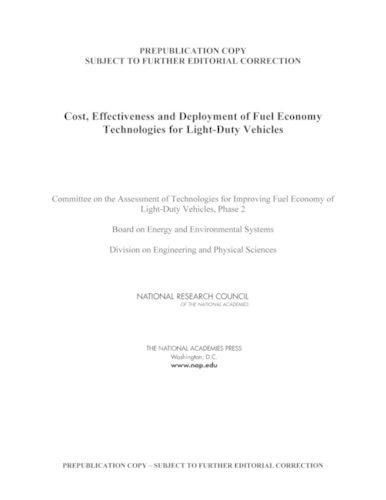Readings Newsletter
Become a Readings Member to make your shopping experience even easier.
Sign in or sign up for free!
You’re not far away from qualifying for FREE standard shipping within Australia
You’ve qualified for FREE standard shipping within Australia
The cart is loading…






The light-duty vehicle fleet is expected to undergo substantial technological changes over the next several decades. New powertrain designs, alternative fuels, advanced materials and significant changes to the vehicle body are being driven by increasingly stringent fuel economy and greenhouse gas emission standards. By the end of the next decade, cars and light-duty trucks will be more fuel efficient, weigh less, emit less air pollutants, have more safety features, and will be more expensive to purchase relative to current vehicles. Though the gasoline-powered spark ignition engine will continue to be the dominant powertrain configuration even through 2030, such vehicles will be equipped with advanced technologies, materials, electronics and controls, and aerodynamics. And by 2030, the deployment of alternative methods to propel and fuel vehicles and alternative modes of transportation, including autonomous vehicles, will be well underway. What are these new technologies - how will they work, and will some technologies be more effective than others?
Written to inform The United States Department of Transportation’s National Highway Traffic Safety Administration (NHTSA) and Environmental Protection Agency (EPA) Corporate Average Fuel Economy (CAFE) and greenhouse gas (GHG) emission standards, this new report from the National Research Council is a technical evaluation of costs, benefits, and implementation issues of fuel reduction technologies for next-generation light-duty vehicles. Cost, Effectiveness, and Deployment of Fuel Economy Technologies for Light-Duty Vehicles estimates the cost, potential efficiency improvements, and barriers to commercial deployment of technologies that might be employed from 2020 to 2030. This report describes these promising technologies and makes recommendations for their inclusion on the list of technologies applicable for the 2017-2025 CAFE standards.
$9.00 standard shipping within Australia
FREE standard shipping within Australia for orders over $100.00
Express & International shipping calculated at checkout
The light-duty vehicle fleet is expected to undergo substantial technological changes over the next several decades. New powertrain designs, alternative fuels, advanced materials and significant changes to the vehicle body are being driven by increasingly stringent fuel economy and greenhouse gas emission standards. By the end of the next decade, cars and light-duty trucks will be more fuel efficient, weigh less, emit less air pollutants, have more safety features, and will be more expensive to purchase relative to current vehicles. Though the gasoline-powered spark ignition engine will continue to be the dominant powertrain configuration even through 2030, such vehicles will be equipped with advanced technologies, materials, electronics and controls, and aerodynamics. And by 2030, the deployment of alternative methods to propel and fuel vehicles and alternative modes of transportation, including autonomous vehicles, will be well underway. What are these new technologies - how will they work, and will some technologies be more effective than others?
Written to inform The United States Department of Transportation’s National Highway Traffic Safety Administration (NHTSA) and Environmental Protection Agency (EPA) Corporate Average Fuel Economy (CAFE) and greenhouse gas (GHG) emission standards, this new report from the National Research Council is a technical evaluation of costs, benefits, and implementation issues of fuel reduction technologies for next-generation light-duty vehicles. Cost, Effectiveness, and Deployment of Fuel Economy Technologies for Light-Duty Vehicles estimates the cost, potential efficiency improvements, and barriers to commercial deployment of technologies that might be employed from 2020 to 2030. This report describes these promising technologies and makes recommendations for their inclusion on the list of technologies applicable for the 2017-2025 CAFE standards.